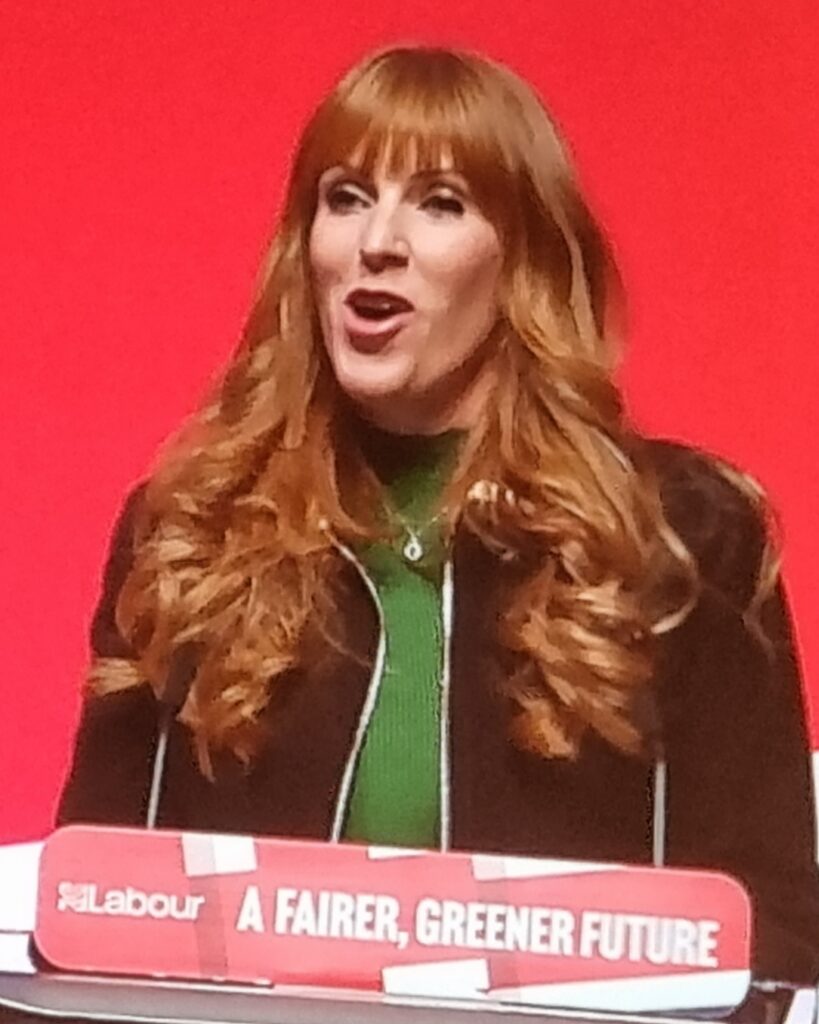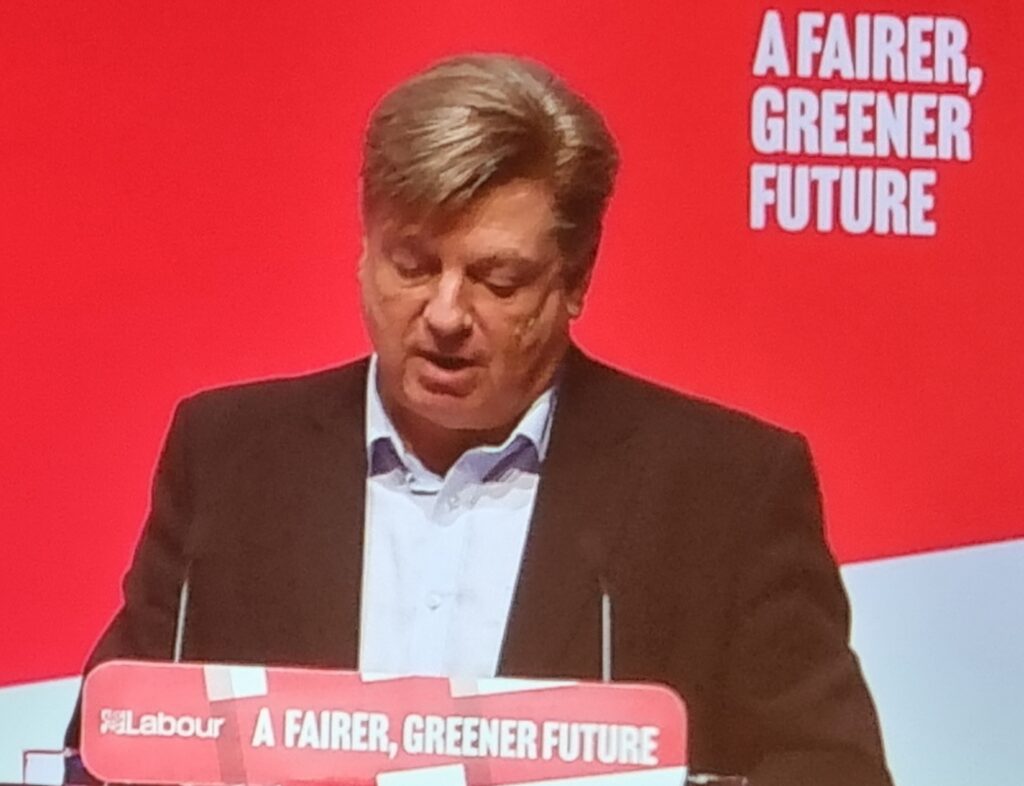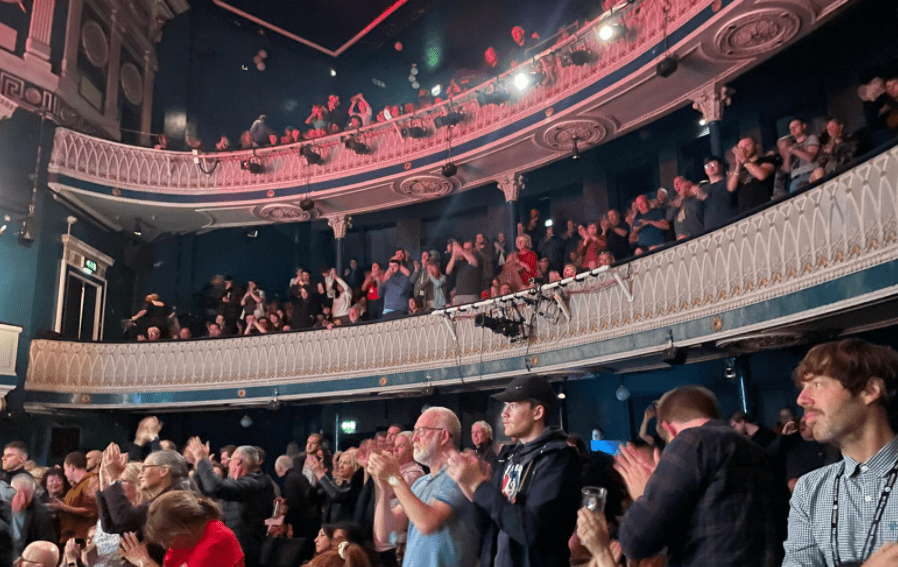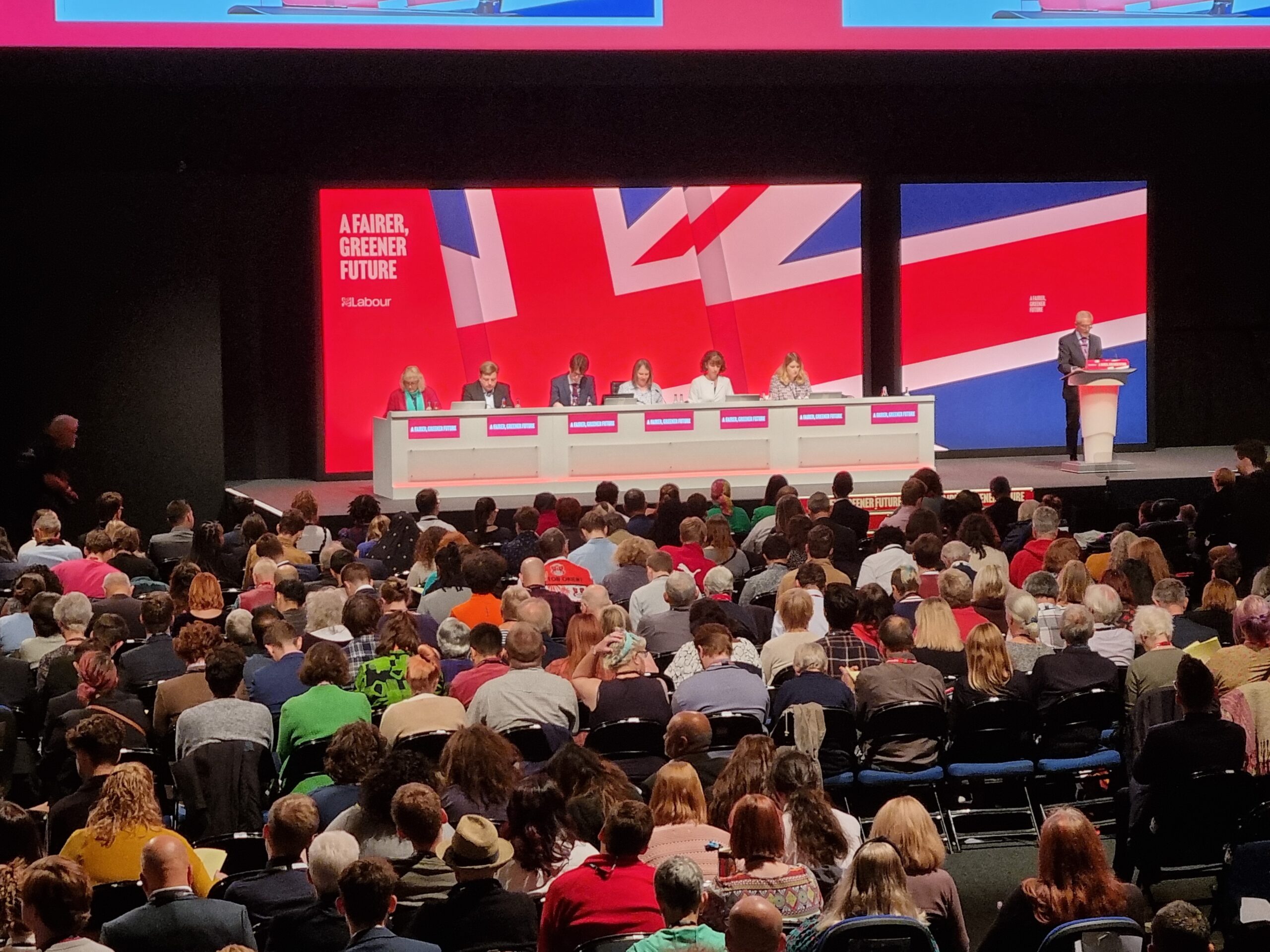By Left Horizons reporters
In an unprecedented departure from past practice, and in keeping with ‘God Save the King’ having been sung before the conference opened, the backdrop to the Labour conference was a slightly skewed Union Jack. Starmer’s relentless march of the party towards a rendezvous with the Lib-Dems or to becoming a slightly skewed Conservative Party seems to going on apace. However, there are still delegates, albeit in a minority, who have different ideas.
Opinions differed about how many there were in attendance when the national anthem was sung in the morning, but there were large gaps in the union seating area, despite stewards trying to fill them up, and a number of those who were present stayed in their seats rather than standing to sing.
In the conference proper, the first of the main items was the speech by deputy leader, Angela Raynor. Although elected by the membership, she is effectively a prisoner of the hard right in the Party and she reflects their views and outlook, referencing the late Queen’s supposed “lifetime of public service” in the first thirty seconds, for example. But she still found it necessary to pepper her speech with radical-sounding phrases – and how could it be otherwise, in the face of the biggest attacks on living standards for generations?
A limited commitment on anti-union laws
“I will defend workers’ rights, including the right to strike”, she told conference, with the added promise to repeal anti-union legislation. It was not immediately clear, however, whether that was a reference to all anti-union legislation, including laws in effect now, or whether it only referred to new measures being proposed by Liz Truss.

A quick check on the release to the press clarified this issue. What she was quoted as saying was “we will repeal all the anti-worker and anti- trade union laws this Conservative Government has enacted” (emphasis added) – so there is no commitment to change current anti-union laws, which are among the most draconian as it is. That is clearly the only reason Starmer applauded that point.
Angela Raynor’s speech went down very well for the number of references she made to the precariousness of everyday life for many working people. Too many people, she pointed out, were ‘on the edge’ between just making ends meet and being in real poverty. She referred to the new Prime Minister as “level-down Liz, trickle-down Liz” and pledged the Labour Party to “make Britain work for working people”. Nothing, in other words, that delegates would oppose. What was interesting was that she made no reference to the most radical and reforming Labour government we have ever had – from 1945 – while she twice referenced the victory of New Labour in 1997. “Just as we needed change in 1997” she said, “we need change now.”
New Labour threw away four million Labour votes
What she didn’t say was that New Labour lost votes in every successive election after 1997, and in the end threw away nearly four million Labour votes, not to mention the New Labour-engineered collapse of Labour in Scotland, from holding nearly all the seats to only one. It was not for the references to 1997, but for the radical-sounding phrases she used that she got a standing ovation, although not by all means from all the delegates and not with the same enthusiasm we saw for genuine left speakers in the Corbyn years.
David Evans, Keir Starmer’s choice for general secretary, received a much more muted reception. It was even nauseating at times, and absolutely astonishing for him to praise Labour’s treasurer, Diana Holland, for restructuring party finance and “getting the Party out of debt”! This is an incredible statement, given that Labour under Jeremy Corbyn was awash with money, mostly from the surge of new membership subscriptions, whereas in the Starmer/Evans era it has slid towards bankruptcy.
Having sacked Labour’s community organisers, the Party is now employing 30 trainee organisers. It has followed a policy of fire-and-rehire under a different guise, just to balance the books.
One notable thing Evans did say was that the Party “accepts” the Forde Report, although it is doubtful to say the least, that any of its recommendations – such as a fairer and more transparent process of discipline – will ever be implemented. After his speech, there was no standing ovation: more like polite applause, and even then many delegates sat on their hands.

Unanimous approval for resolutions against violence against women
After these set speeches there were two important sessions in conference. The first was a number of motions, including one from the Labour women’s conference, on violence towards women and girls. There were some very good speeches on this issue and, as ought to be expected in a labour movement conference, they were met with general sympathy and support, with no disagreement at all. On a show of hands all of these resolutions were passed without any opposition.
More controversial was the session around party rule changes. Changes proposed by the NEC were felt by delegates to be a “power grab” by the NEC, especially where they dealt with the selection of parliamentary candidates. As more than one CLP delegate pointed out, it is appalling to claim that head office interference is justified to get “good quality” candidates – that is actually a serious insult to local party members – when there are often experienced local activists who are perfectly capable of doing the job.
We all know, of course, that the rules giving more power to the NEC – in reality to David Evans and Keir Starmer – to select candidates, is a means of ensuring that the right-wing faction of the Party has its own preferred candidates ‘officially’ parachuted into local areas, as they have done for years unofficially.
Right wing have engineered a greater weight among CLP delegates
Compared to previous conferences, there is an increased influence of the right wing among CLP delegates, largely thanks to a much smaller membership and anti-democratic and bureaucratic restrictions on CLPs and individual lefts. All of the rule change resolutions were voted on with card votes, and so, given the increased weight of the right wing in the CLPs and their hold on three of the big, affiliated unions, we can probably expect the NEC endorsed changes to go through and those changes opposed by the NEC to fall. The results will be declared tomorrow, so we will see.
The highlight of the evening fringe was undoubtedly the Enough is Enough rally, held in the Liverpool Playhouse Theatre, to a packed capacity of nearly 800. Among the speakers were, Kuumba Imani of the Liverpool Millennium centre, speaking on the Liverpool Black sisters struggle, Jess Barnard speaking on behalf of Young Labour, Labour MPs Zara Sultana and Ian Byrne and trade union leaders, Dave Ward and Mick Lynch.
We have no space here to report on all of the speeches, but all of the speakers, in their own different ways, outline the awful plight that working class people face at the moment. There was an electric atmosphere in the hall, as one speaker after another denounced a system utterly rigged against ordinary households and condemned a government hell-bent on pauperizing millions.
The Tories were clearly the main target of peoples’ anger, but there was no little criticism of Starmer, too. “If Keir Starmer is not going to stand up for us” Jess Barnard said, “he needs to stand out of the way”.
Enough is Enough is a growing campaign, with inbuilt contradictions
Enough is Enough is a campaign that seems to be getting a lot of support, drawing in Labour lefts and probably a lot of former Labour lefts, as well as some who have not been in the Party. Up and down the country, they have drawn large numbers to their rallies.

But as a movement, there are still contradictory strands within it. One of its main sponsors, the CWU General Secretary, Dave Ward, pointed to the need to “bring together working-class people across our country in our workplaces and our communities to forge a new political consensus”, something that has been a long-standing policy of his union.
He also pointed out that nearly three quarters of a million people have now signed up to EiE and he highlighted the need to get as many of them as possible out on the streets for the planned day of action on Saturday, October 1, in support of striking rail and communication workers.
Although he explicitly talked about “driving the Labour Party into the place it should be” that is not a message that comes over clearly. There is a thread of opinion running through EiE that seems to be wanting to stand aloof from the struggle in the Party. A different CWU official, acting as chair for the meeting, said that EiE was “a movement of trade unions and of people not linked to political parties” a somewhat different position to his general secretary.
An electrifying and lively rally, but still on the fringe of conference
Even Zara Sultana spoke about “action not committees”, although it is not really clear in a serious political way, what this means. It is one thing to talk about “class war” and the need to be “on the winning side” but that has to imply a political struggle and clear political goals, neither of which at this stage, can ignore the struggle for ideas inside the Labour Party.
The five demands of the Enough is Enough campaign are these:
1. A real pay rise
2. Slash energy bills
3. End food poverty
4. Decent homes for all
5. Tax the rich
As Left Horizons argued in an editorial, the very existence of the Enough is Enough campaign stands as a rebuke to a Labour Party which is not itself campaigning for these things, but the absence of a clear political strategy within EiE is also a weakness. The presence of a huge and electrifying rally on the fringe of the Labour conference is a recognition of the importance of the Labour Party, despite the present domination of the right-wing. The task is not for the left to remain on the fringe, but to fight back against the right wing and drive them from the positions they hold.
Day 2 report tomorrow



